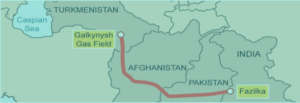In news : During the Heart of Asia conference, Afghanistan President lauded India’s air effort with respect to the Turkmenistan-Afghanistan-Pakistan-India (TAPI) pipeline.
About TAPI Pipeline
- Also known as Afghanistan Pipeline, it is a natural gas pipeline being developed by the Galkynysh – TAPI Pipeline Company Limited
- The TAPI Pipeline extends for approx. 1,600 kilometers (km), from the Turkmenistan (TKM)-Afghanistan (AFG) border to the Pakistan (PAK)-India (IND) border.
- The pipeline will transport 33 billion cubic meters (bcm) of natural gas annually from TKM to respective buyers in AFG (5%), PAK (47.5%) and IND (47.5%) during the 30-year commercial operations period.
- The Project comprises the procurement, installation and operation of the pipeline and related facilities within AFG and PAK.

Financial aid
- The TAPI project is being funded by the Asian Development Bank (ADB), which is also acting as transaction adviser for the development.
- Turkmenistan took a loan of $700m from Islamic Development Bank for financing the project in December 2016.
- The remaining three countries made an initial investment of $200m in the TAPI project.
Details of the TAPI route
- The TAPI gas pipeline will transport gas produced from the Galkynysh gas field in Turkmenistan to Afghanistan, Pakistan and India. It will have a diameter of 56in and a working pressure of approximately 10,000 kilopascals (kPa).
- The pipeline will start from the Mary region of Turkmenistan and cover a total distance of 214km up to Afghanistan. The Afghanistan section will be built along the highway.
- The pipeline will run through Kandhar and Herat highway in Afghanistan, for a length of 774km. It will cover 826km in Pakistan, across the cities of Quetta and Multan, finally terminating in Fazilka at the Indo-Pakistan border in Punjab region, India.
- The pipeline will initially transport 27bcm of natural gas a year, which will be increased to 33bcm after one year of operation.
Implementation
The project implementation is split into two phases:
- Phase 1: AFG and PAK sections of the pipeline based on a free-flow transmission capacity of 11 billion bcm /annum; and
- Phase 2: six compressor stations along the AFG and PAK sections to ramp up to the full gas transmission capacity of 33 bcm / annum.
Significance f the project
- Once operational, the TAPI Pipeline will allow TKM to diversify and expand its gas export markets to the southeast, into AFG, PAK, and IND.
- The Central Asia Regional Economic Cooperation (CAREC) Programs Strategy for Regional Cooperation in the Energy Sector has identified the TAPI Pipeline as one of the main links in the inter-energy relationship among CAREC countries.
- Overall, the TAPI Pipeline will have transformational impact on regional cooperation and will also support other initiatives aimed at increasing growth and economic stability in the region.
- The Project is aligned with the development strategies of TKM, AFG, PAK and IND, as reflected in their respective Country Partnership Strategies, and is also consistent with the objectives of ADBs Strategy 2030.
















